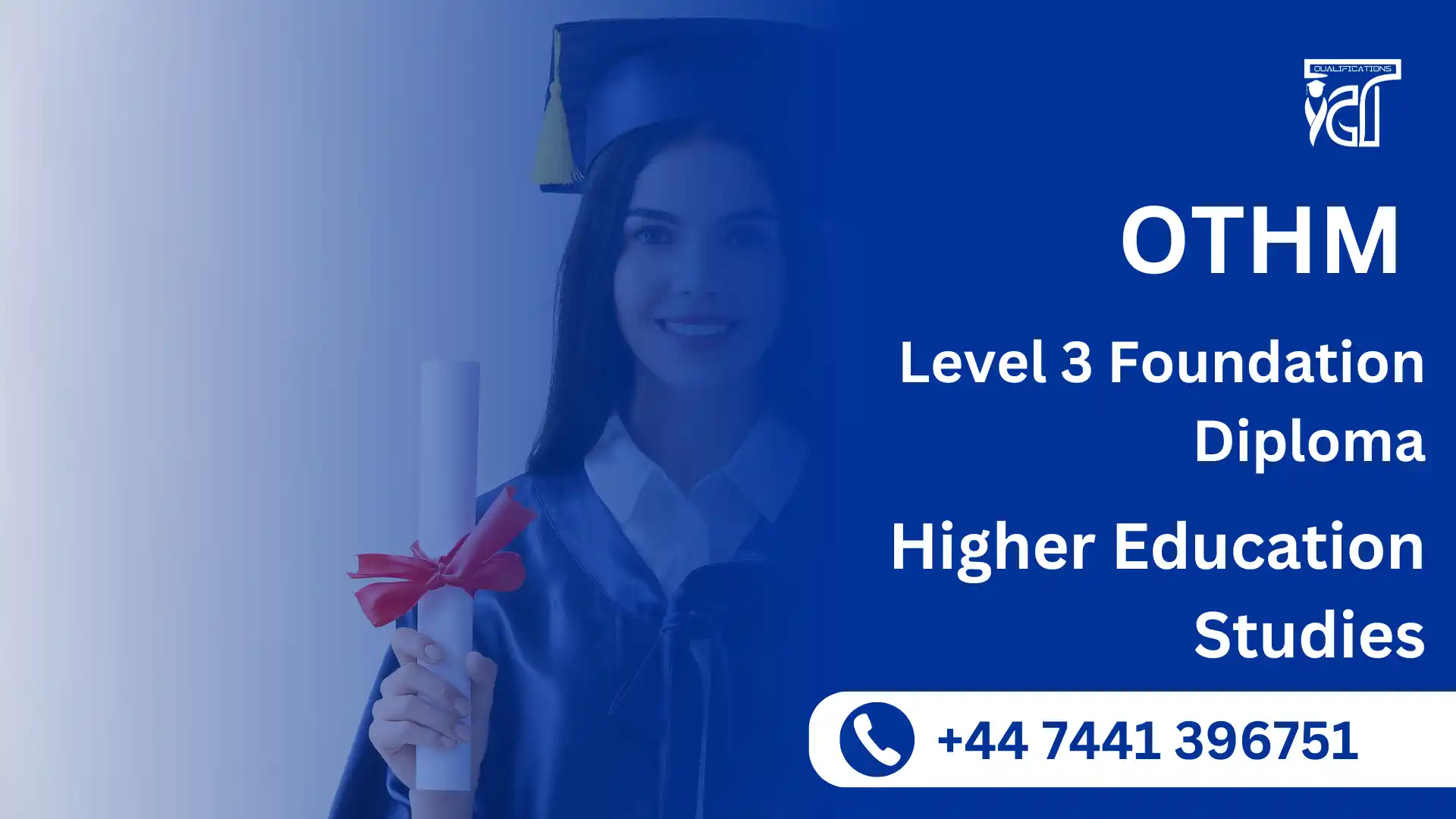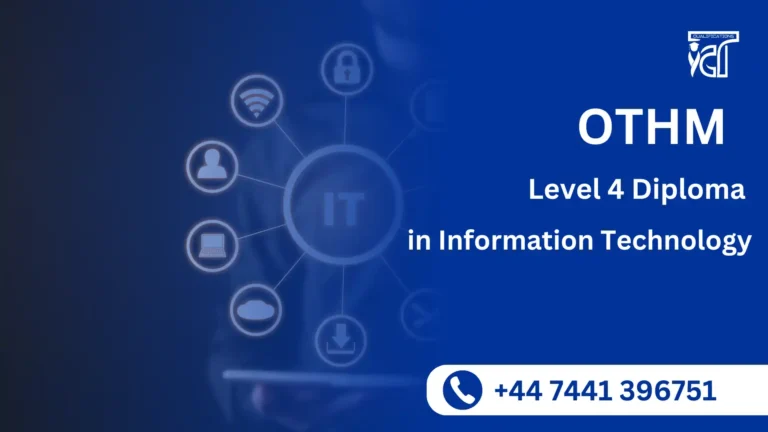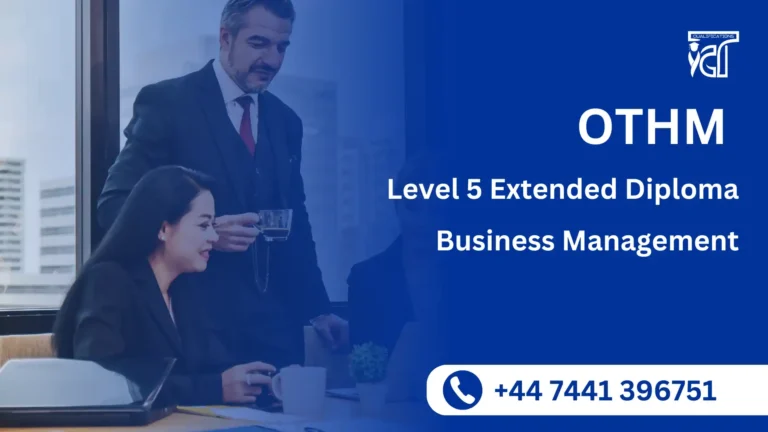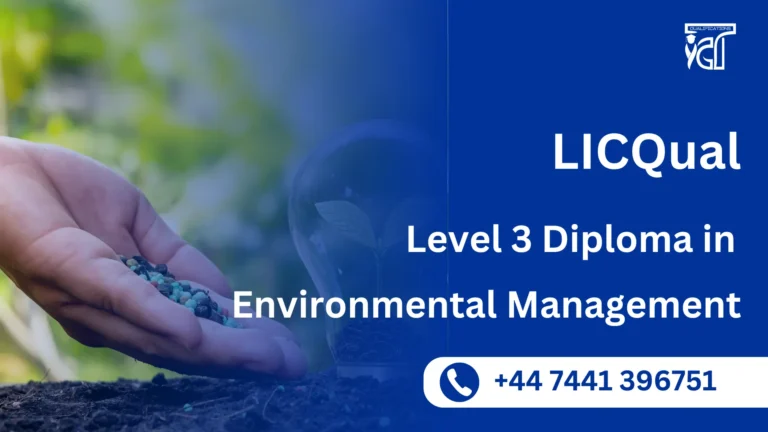Higher education is a crucial stepping stone toward academic and professional success. If you aspire to gain entry into a university program but lack the necessary qualifications, the OTHM Level 3 Foundation Diploma for Higher Education Studies offers an excellent pathway. This qualification, regulated by Ofqual (Office of Qualifications and Examinations Regulation), is designed to equip learners with essential academic skills, preparing them for further education and career advancement.
The OTHM Level 3 Foundation Diploma for Higher Education Studies is an internationally recognized qualification that provides a comprehensive introduction to academic disciplines, study skills, and research methodologies. It is ideal for individuals seeking an alternative route to higher education. OTHM Level 3 Foundation Diploma for Higher Education Studies is particularly beneficial for those who may not have conventional qualifications but wish to pursue a university degree or enhance their professional prospects.
A major advantage of the OTHM Level 3 Foundation Diploma is its university progression routes. Many universities recognize this qualification, allowing students to gain direct entry into undergraduate degree programs. This diploma serves as a bridge, preparing students for the rigors of higher education while improving their academic confidence and study skills.
The OTHM Level 3 Foundation Diploma for Higher Education Studies is an excellent choice for individuals aiming to enter higher education or enhance their academic and professional prospects. Its Ofqual-regulated status, assignment-based approach, and university progression opportunities make it a valuable and accessible qualification.
OTHM Level 3 Foundation Diploma for Higher Education Studies
The OTHM Level 3 Foundation Diploma for Higher Education Studies comprises six mandatory units, amounting to a total of 120 credits. The qualification includes 1,200 Total Qualification Time (TQT) hours and 600 Guided Learning Hours (GLH), ensuring a well-rounded and in-depth learning experience.
Mandatory units
| Sr# | Unit Title | Credits | GLH |
|---|---|---|---|
| 1 | Academic English and Study Skills | 20 | 100 |
| 2 | Foundation Mathematics | 20 | 100 |
| 3 | Foundation Computing | 20 | 100 |
| 4 | Society and Culture | 20 | 100 |
| 5 | Introduction to Business | 20 | 100 |
| 6 | Foundation Accounting and Economics ( | 20 | 100 |
GLH (Guided Learning Hours) and TQT (Total Qualification Time) are terms commonly used in vocational qualifications to help define the amount of time a learner is expected to spend on heir studies.
1. GLH (Guided Learning Hours)
GLH refers to the number of hours a learner spends being directly taught, supervised, or supported during their course. This includes the time spent in activities such as:
- Classroom instruction
- Practical workshops
- One-on-one tutoring or mentoring sessions
- Online learning sessions with tutor support
In other words, GLH represents the time that learners are actively engaged with their instructors or learning activities.
2. TQT (Total Qualification Time)
TQT represents the total amount of time a learner is expected to invest in completing a qualification, including:
- GLH (Guided Learning Hours): Time spent on direct learning, as explained above.
- Self-Directed Learning: This includes time spent on independent study, research, assignment completion, preparation for exams, and any other work the learner does outside of direct teaching hours.
TQT is a broader measure that includes all the time required to achieve the qualification. It helps learners and employers understand the overall commitment required for the qualification.
Key Differences Between GLH and TQT:
- GLH focuses on direct learning with guidance or supervision.
- TQT includes GLH as well as independent study time and other learning-related activities.
Example:
If a qualification has a TQT of 600 hours and a GLH of 250 hours, it means the learner should spend 250 hours in direct learning (classroom, online, or tutor-led sessions) and 350 hours on independent study or research.
Learning Outcomes of OTHM Level 3 Foundation Diploma for Higher Education Studies
Academic English and Study Skills
- Be able to interpret data from academic texts for a chosen topic.
- Be able to apply academic conventions.
- Be able to extract key information from lectures, talks and discussions.
- Be able to use ICT resources for information gathering,
Foundation Mathematics
- Understand the basic rules of numeracy in the context of undergraduate courses.
- Be able to make and apply fundamental calculations and use algebraic equations.
- Be able to construct and use graphs, charts and diagrams.
- Be able to apply statistical methods to provide business or management information.
- Be able to apply the laws of probability to find solutions to a range of problems.
Foundation Computing
- Understand fundamental concepts of hardware and software.
- Understand the types and characteristics of hardware
- Understand how various data are represented in a computer system.
- Understand the fundamentals of computer networks.
- Understand the ethical and legal issues related to computing.
Society and Culture
- Understand the process of socialisation.
- Understand the nature of social and cultural continuity and change.
- Understand the interaction between popular culture, society and the individual.
Introduction to Business
- Understand the structure and classification of businesses.
- Understand the aims and characteristics of business types.
- Understand the inter-relationships between organisations.
Foundation Accounting and Economics
- Understand the essentials of accounting and economics.
- Understand the nature of markets and how they operate.
- Understand different factors within the realm of accounting and economics.
- Demonstrate the ability to apply key accounting concepts.
The Course Benefits of the OTHM Level 3 Foundation Diploma for Higher Education Studies are as :
1. Enhanced Academic Skills
This diploma equips learners with essential study skills, including research techniques, critical analysis, and academic writing, which are crucial for success in higher education.
2. Flexible and Accessible Learning
With the option to study online or through approved OTHM centers, students can balance their education with work and personal commitments.
3. No Exam Pressure
The course follows an assignment-based assessment model, eliminating the stress of high-stakes examinations while ensuring continuous learning and progress.
4. Recognized Qualification
Being Ofqual regulated, this diploma is widely accepted by universities and employers, enhancing career and education prospects.
5. Direct Progression to University
Successful graduates can gain direct entry into various undergraduate programs, streamlining their transition to higher education.
6. Career Advancement Opportunities
The skills gained from this diploma not only prepare students for further studies but also provide a strong foundation for professional growth in various sectors.
7. Practical and Real-World Application
Through assignments and coursework, students develop practical problem-solving skills that can be applied in both academic and professional settings.
The ideal learner of the OTHM Level 3 Foundation Diploma for Higher Education Studies are as:
1. Aspiring University Students
This qualification is perfect for individuals who want to pursue a university degree but do not meet the standard entry requirements. The diploma provides the foundational knowledge necessary for academic success at the undergraduate level.
2. Career-Oriented Professionals
Working professionals looking to enhance their academic qualifications for career growth can greatly benefit from this diploma. It equips them with essential skills that are highly valued across various industries.
3. International Students
Students from non-traditional education backgrounds or those looking for a recognized qualification to support university admission in the UK and other countries will find this diploma an excellent choice.
4. Individuals Seeking Flexible Study Options
For learners balancing education with work or family commitments, this assignment-based and flexible course structure allows them to progress at their own pace without the pressure of exams.
5. Students Who Prefer Practical Learning
This diploma is ideal for those who thrive in coursework-based environments rather than exam-based learning. The program fosters analytical thinking, problem-solving, and research skills through assignments and practical assessments.
Entry Requirements
To enroll in the OTHM Level 3 Foundation Diploma for Higher Education Studies, learners must meet the following entry requirements:
Register Now
Qualification Process
Qualification Process OTHM Level 3 Foundation Diploma for Higher Education Studies
- Self-Assessment:
Begin by evaluating your eligibility to ensure you meet the qualification requirements, including work experience, knowledge, and language proficiency. - Registration:
Complete your registration by submitting the required documents, including a scanned copy of a valid ID, and paying the registration fee. - Induction:
An assessor will conduct an induction to confirm your eligibility for the course and explain the evidence requirements. If you do not meet the criteria, your registration will be canceled, and the fee will be refunded. - Assignments & Evidence Submission:
Provide all assignments and the necessary evidence based on the assessment criteria outlined in the course. If you are unsure of the required evidence, consult with the assessor for guidance on the type and nature of evidence needed. - Feedback and Revision:
The assessor will review your submitted evidence and provide feedback. Evidence that meets the criteria will be marked as “Criteria Met,” while any gaps will be identified. You will be asked to revise and resubmit if needed. - Competence Evidence:
Submit final evidence demonstrating that all learning outcomes have been met. This evidence will be marked as “Criteria Met” by the assessor once it is satisfactory. - Internal Quality Assurance (IQA):
The Internal Quality Assurance Verifier (IQA) will review your evidence to ensure consistency, quality, and compliance with standards. - External Verification:
The IQA will submit your portfolio to OTHM External Quality Assurance Versifier (EQA) for final confirmation. The EQA may contact you directly to verify the authenticity of your evidence. - Certification:
Upon successful completion of all checks, OTHM will issue your official certificate, confirming that you have attained the OTHM Level 3 Foundation Diploma for Higher Education Studies







